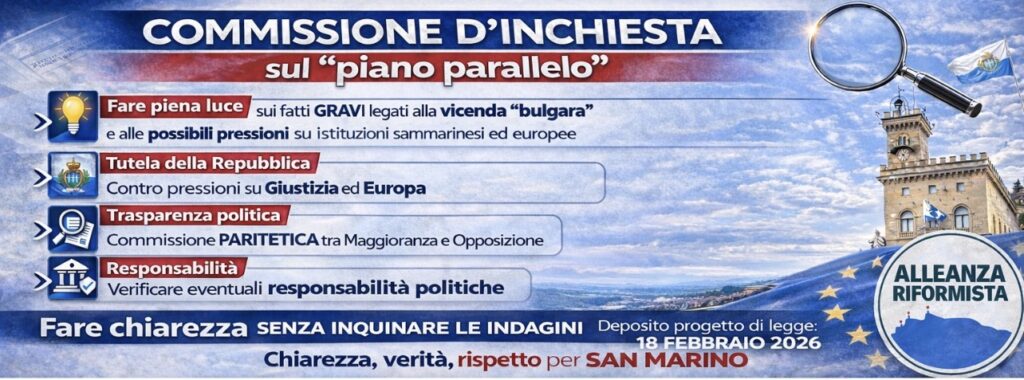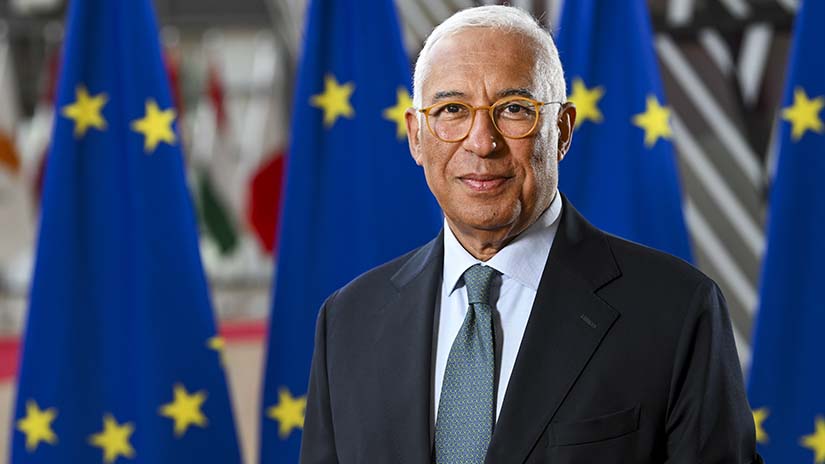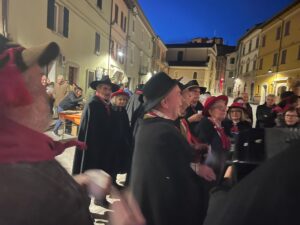The San Marino–EU Association Agreement has reached the most critical point since the conclusion of negotiations in 2023. Yet while the file is bogged down in Brussels, San Marino continues to promote an image of serenity, cooperation and “final steps”. The show staged last night at the Kursaal looked more like a political variety performance than a serious discussion of a strategic dossier. Carefully selected audience, reassuring tone, triumphant narrative.
The reality — concrete, procedural, political — is radically different.
The truth is that the agreement is now exposed to a very real risk of implosion. Not a remote hypothesis, not opposition propaganda: a structural risk, rooted in internal EU divisions, France’s stance, Andorra’s constitutional constraints and procedural timelines that are stretching far beyond expectations.
The official narrative speaks of “a single technical issue”. In reality, the dossier is still blocked in Brussels on the crucial question of the legal nature of the agreement: EU exclusive competence or mixed competence, meaning ratification by all 27 national parliaments. It is the difference between a linear process and a political-legal purgatory lasting years, where any single state can exercise a final veto.
And while San Marino tries to minimise the situation, France has formally stated that, for Paris, the agreement must be mixed.
This is a devastating blow to the exclusive-competence scenario: a mixed agreement triggers a far more fragile, slower and riskier path. It will take at least 10 years before a conclusion — and a single NO from any country kills the agreement.
Dead. Gone.
Other countries are not aligned. The EU Council is divided, despite last night’s public reassurances.
This is also where the meeting held yesterday between Foreign Minister Luca Beccari and Antonio Costa, President of the European Council, comes into play.
At the Kursaal it was described as “positive”, but in reality — according to multiple sources — it was anything but reassuring.
Costa reportedly made it clear that the dossier has already come close to collapsing, and that the situation remains politically “sensitive”, meaning unstable.
Translated from diplomatic language, this means only one thing: the agreement has entered the red zone.
We’re underwater.
To make matters worse, there is Andorra, which is far from a minor detail. The reality is that Andorra:
– must submit the agreement to a popular referendum,
– cannot apply it provisionally,
– and may take years before completing its ratifications.
The result?
San Marino may start provisional application in 2026, spend money (and it would be interesting to know how much has already been spent, but we are not told), rewrite laws, reorganise supervisory authorities… while Andorra remains stuck.
And if even one of the 27 national parliaments — or the Andorran referendum — says NO, the agreement enters political default: everything freezes, and we are left stranded in mid-stream after having already paid the cost of compliance.
This is not conspiracy theory.
It is the logical consequence of a mixed agreement.
And it also explains why those in Europe who tried to help us by defending the exclusive-competence option are now in trouble: France shut that door, and other countries will not oppose it.
The Danish presidency is trying to broker a compromise, but still lacks political unanimity.
There is another element that was not mentioned to the public last night: once San Marino enters a mixed-competence Association Agreement, all previous bilateral agreements with European states automatically fall away.
This is mandatory: the EU requires normative coherence.
The Association Agreement absorbs and replaces all previous ones.
And what if the European Union says NO?
Or if a national parliament blocks ratification?
Or if Andorra, through its referendum, sinks the agreement?
Then San Marino is left without the new agreement and without the old ones.
A true regulatory void: the worst possible outcome.
The default of the agreement: no protection, no legal framework, no credibility.
SAN MARINO WOULD FALL INTO TECHNICAL DEFAULT BY NO LONGER BEING COVERED BY ITS AGREEMENTS WITH ITALY/EU.
Given all this, continuing to stage celebratory evenings, graphics and polished storytelling is a serious political mistake.
The country does not need another institutional performance: it needs the truth.
And the truth is simple:
– The agreement is much closer to collapse than to entering into force.
– Mixed competence opens a long, fragile and reversible path.
– Andorra is a major destabilising factor.
– France has changed the game — not in our favour.
– If the EU says no, we lose everything: the new agreement, the old ones (if we RATIFY), and our credibility.
– And even Costa hinted that the dossier almost failed.
The Kursaal may applaud.
Brussels will not.
And the gap between the two is now the real political problem of the country.
I would not want to be in the shoes of my friend, Foreign Minister Luca Beccari.
If this agreement collapses — and all indicators now say it is more than likely — the political consequences will be immediate: resignation, a government crisis, perhaps more.
It is inevitable.
This agreement has been presented as the flagship of the legislature, and a failure of this scale would sweep away any political figure responsible for it.
I am sorry to say it — not because of the agreement itself, whose technical and political flaws we already know — but for the person.
I have a personal friendship with Beccari; I consider him a decent man.
But on this dossier our visions are opposite: I consider this agreement harmful to the Republic and to the Sammarinese, a path that exposes the country to enormous risks, permanent imbalances and an uncertainty we cannot afford.
And precisely because there is a personal relationship, it pains me even more to see how the internal narrative tries to cover a situation that, in Brussels and in Andorra, is anything but positive.
When reality hits, it spares no one: not governments, not friendships, not good intentions.
And today, unfortunately, reality is knocking loudly.
Marco Severini – Director of GiornaleSM














